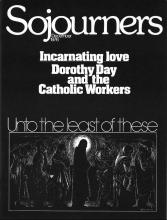Jim: You converted from communism to Catholicism. How does Marxism differ from Christianity on questions of power and violence and how change comes? In your life you've always been on the side of the poor.
Dorothy: Oh, I've always certainly been on the side of social change. But I think so much can be done with nonviolence.
My hard-line communist friends used to say, "Dorothy's never going to be a good communist. She's too religious." They take religion far more seriously than most religious people do.
The Catholic Worker movement has always believed in nonviolence. But we have stood for the idea of the possibility of social change that comes of study, direct action, and, as Peter Maurin said, building up the new society within the shell of the old.
I do think that there are possibilities for a nonviolent revolution, but most people are impatient. It's more romantic to pick up a gun and go off and be a guerrilla. But in this case, the noble person is that man who has just received a 10-year sentence for sheltering guerrillas who were wounded and giving them medicine.
Wes: Peter Maurin talked about anarchism as personalism. How does this relate to the development of alternatives for social change?
Dorothy: The personalist and the communitarian go together. The community can act together so much more effectively that the person can.
I think that United Farm Workers is a very good example of people who are trying to put these things into effect. Caesar Chavez is interested in communities which have common industries and free clinics. He is interested in being engaged, you might say, in a decentralized way. I think these things are very practical and immediate.
Read the Full Article

